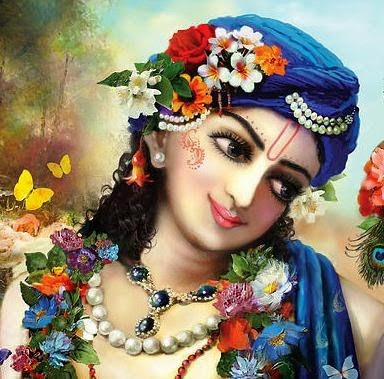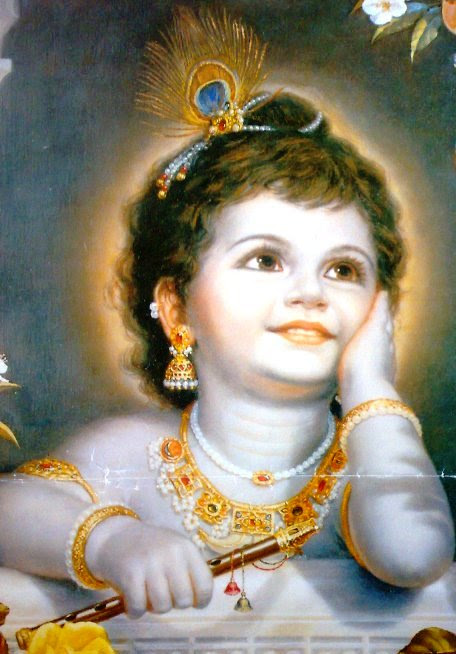When I decided to join the Hare Krishna’s my parents, of course, tried to dissuade me. One of the more memorable arguments my dad offered went something like this, “You say you want to dedicate yourself to serving God, but how do you know what God wants from you? Maybe God wants you to finish college, not join the Hare Krishna’s. There are so many people who did horrible things, from the terrorists in the Middle East to the Crusaders and the Spanish Inquisition, and all of them were completely convinced that they were doing what God wanted.”
I’m not exactly sure how I replied at the time, but I am sure my reply must have scared the crap out of him. I seem to remember saying something like, “Krishna explains what he wants to very spiritually advanced people, and then those people explain it to others, and those people explain it to others. It’s a system called paramparā and it’s how an ordinary person like you or me can learn what God wants from us.”
The problems inherent in this system were not missed by my dad, who immediately replied, “So, you are relying on some other person to tell you what God wants??? Come on, Vic! All you’ll find out is what that person thinks God wants! And what if that person is not as pure and ‘spiritually advanced’ as you think? What if they use the idea that ‘God wants’ something as a way to get what they want?”
I probably replied that spiritual advancement is not something I would accept on faith. It is something demonstrable through tangible character traits, qualities, and behaviors – for example: renouncing positions of power and wealth. In reply, my father probably pointed out that the leaders and gurus of ISKCON hardly seemed to have “renounced positions of power and wealth.”
And so the whole argument just wound up a mess.
My Answer Today…
These days, my answer to the question, “How do you know what God wants?” is markedly different. I have this answer because I was able to learn śāstra under the guidance of paramparā – but the answer itself does not rely on a “chain of command.”
Before we can make sense of what “God wants” we have to make sense of what “God is.”
janmādy asya yathā
God is the source of all reality. And what is “reality”?
vadanti tat tattva-vidas tattva-yaj jñānam-advayam
Those who know what reality is, say it is “infinite consciousness.”
“Consciousness is the ultimate singular root of all things.” — 12.13.12
All of reality is contained within consciousness, and “God” is the origin of all consciousness – the original fount of consciousness – the original consciousness.
brahmaṇo hi pratiṣṭhāham
Now that we know what God is, we can figure out what God wants.
God is consciousness. What does consciousness want? You and I can answer this question confidently because you and I are also consciousness, just like God. We just need to introspect. What does consciousness want?
Consciousness wants something worth being conscious of!
What is worth being conscious of? Happiness.
Where does happiness come from? Many places, but the origin of all of them is the real or imitation perception of being loved. Love, then, is the ultimate happiness, and thus the ultimate thing that consciousness (“God”) wants.
Love is soul of happiness, and thus the thing our consciousness wants most.
What is love?
anyābhilāṣitā śūnyaṁ jñāna-karmādy anāvṛttam
anukūlyeṇa kṛṣṇānu-śīlanaṁ bhaktir-uttamam
Love is an unobscured and un-motivated expression of our desire to please someone.
What does God want from me? Today, my answer is very simple:
God wants the same thing everyone wants: love.
I think, at some point in our increasingly frequent debates, I must have said something like this to my dad, because I remember him asking, “How can we love God? He is not here, at least not in the same way you or I am.”
To answer this, we should first understand the essence of how we love anyone. Then perhaps we can really answer how that same essence could be applied to God – an entity currently outside our direct sensorial range.
The essence of love is desire – specifically, the desire to please (anukūlyatā). What is desire? It is an inherent condition of consciousness. Desire is consciousness experiencing its inherent want/need for a positive connection to something worth being conscious of. So, the essence of love is really the desire to focus my attention on someone – to focus my consciousness upon another consciousness in the effort to learn what pleases the other and to then strive to deliver it.
The funny, amazing, beautiful thing, is that what pleases consciousness most is this focus itself!
Diamond rings are a classical example of how a man expresses romantic love to a woman. But rich women who have ten diamond rings yet get very little attention from their rich man do not experience much happiness, indeed they become very depressed and complicated. Toys are a classical example of how a parent expresses love for a child, yet children with storehouses of the finest toys but little genuine attention from mom and dad are not happy children, and grow up to become troubled individuals.
In love, the attention paid to the beloved is more important than the expression symbolizing it!
Consciousness wants happiness, happiness comes from love, and the concentrated essence of love is the focus and attention we give to the object of love. Thus, what people really want, what consciousness really wants, is to become an object that some other consciousness finds worthy of being conscious of!!!
So, what does God want?
God wants the same thing everyone wants: to become an object of love; to become something worthy of attention and dedication; to become something another consciousness finds worthy of being conscious of, something that makes another consciousness happy!
How can we give God what he wants? How can we focus our attention and consciousness on him?
Should we do it by following paramparā? Yes, but rather than stressing the chain of command, let us stress the chain’s command!!! For if the chain produces no worthy command, it is no chain at all.
What is the command from the chain of Gauḍīya Paramparā?
The command is to give God what he wants.
What does God want?
Love!
How can we love God?
By focusing our attention on him.
How?
The easiest, simplest, best way to do what God wants (to love him, by focusing attention on him) is to focus our consciousness on his NAMES!
Isn’t this simple, natural, and downright beautiful? Finally it is clear how it has nothing to do with Spanish Inquisitions, Crusaders, or “Islamic States.”
Frankly God doesn’t give a flying discus whether we do this or that or the other thing in our hallucinations and ignorance-induced dream-life. He doesn’t give a damn if America, Russia, Iran or any other secular or religious group is dominant. He doesn’t care if this branch of some religion gains more followers and capital than that other branch! That is all an outcome of the karma momentum generated by our own independent actions and choices. God doesn’t really concern himself with whether we turn left or right at the light – for neither turn is particularly un/important.
What God really wants is simply what everyone wants: love, attention. And how can we give him this love and attention? Te same we give anyone love, by paying attention to them! How can we pay attention to God? A very effective, easy way is to concentrate on his names.
Therefore Śrī Krishna Caitanya descended into our modern age several hundred years ago to make a point about the importance of nāma-mantra, nāma-japa, nāma-bhajan, nāma-saṁkīrtan.
sarvātmā snapanam param-vijayate śrī kṛṣṇa-saṁkīrtanam!
If we sincerely want to do “what God wants;” if we sincerely want to love God, then nothing is more important the depth, purity and focus we give to our meditation of God’s names – which we are extremely fortune to have in an extremely primal and intimate form, in the kṛṣṇa-nāma mahāmantra:
hare krishna, hare krishna, krishna krishna, hare hare
hare rāma, hare rāma, rāma rāma, hare hare
– By Vraja Kishor das (VrajaKishor.com)
Tagged:
cult,
hare krishna mahamantra,
Japa,
Love,
Meditation,
serve god,
terrorist 




















 Pavitraropana
Pavitraropana Appearance of Lord Balaram
Appearance of Lord Balaram Janamashtami Grand Celebration
Janamashtami Grand Celebration
 Gift Shop
Gift Shop







